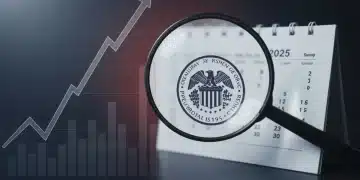Inflation impact on savings UK: What you need to know

Anúncios
Inflation impacts savings by reducing purchasing power, making it essential to diversify investments, use high-yield accounts, and stay informed to effectively protect your finances.
Inflation impact on savings UK is a pressing issue for many of us. Have you ever wondered how rising prices may be quietly chipping away at your savings? Let’s dive into this topic and explore its implications.
Anúncios
Current inflation trends in the UK
Understanding current inflation trends in the UK is crucial for everyone looking to secure their financial future. When prices rise, the value of money can decrease, affecting how much you can save and spend. In recent months, inflation has been a hot topic in the media.
One driving factor behind these changes is the increase in energy costs. Recent reports have indicated that energy prices have surged, impacting households and businesses alike.
Anúncios
Recent Inflation Rates
As of recent data, the UK’s inflation rate has shown fluctuations. It’s essential to stay updated on these changes as they directly influence your savings. Higher inflation can lead to increased costs of living, making it more challenging to save money.
Factors Influencing Inflation
Several factors contribute to rising inflation in the UK:
- Supply chain disruptions affecting product availability.
- Increased demand for goods as the economy reopens.
- Government policies aimed at stimulating growth.
- Global economic influences from other countries.
Each of these elements plays a significant role in shaping economic conditions. Being aware of these can help you navigate your savings and spending effectively.
With these ongoing changes, some questions remain. Will inflation continue to rise, or can we expect stabilization? Keeping an eye on these trends will inform your savings strategies and ensure you make prudent decisions.
How inflation affects saving strategies

Understanding how inflation affects saving strategies is vital for anyone who wants to maintain their financial health. As prices rise, the purchasing power of money decreases, which means your savings might not stretch as far as they once did.
Many people wonder how they can protect their hard-earned money from these increasing costs. One effective way to combat inflation is by adjusting your savings strategy. Look at where you stash your money.
Types of Savings Accounts
Choosing the right savings account can make a big difference. Here are some common options:
- High-yield savings accounts typically offer higher interest rates.
- Certificates of deposit (CDs) lock money in for a term but offer better rates.
- Inflation-protected securities (TIPS) may provide a safeguard against inflation.
- Regular savings accounts are less effective due to lower interest rates.
The choice of account can impact how your savings grow over time. With inflation rates rising, it’s crucial to explore options that yield better returns.
Moreover, shifting your investment focus can also help. Consider incorporating asset classes that generally outperform inflation. They often include:
- Real estate investments.
- Stocks that have a history of rising prices.
- Commodities, such as gold or oil.
By diversifying your investment portfolio, you can potentially offset the negative impacts of inflation on your savings. Stay informed about market trends to adjust your strategies as necessary.
Changing your mindset from saving to investing can also make a significant impact. When you save, you often preserve value; however, investing has the potential for significant growth, helping you stay ahead of inflation.
The role of interest rates during inflation
The role of interest rates during inflation is a critical aspect of economic stability. When inflation rises, central banks often respond by adjusting interest rates. These changes can significantly impact both savings and borrowing.
Higher interest rates typically aim to slow down inflation. When borrowing costs increase, both consumers and businesses tend to spend less, which can help cool down an overheating economy.
How Higher Interest Rates Affect Consumers
For individuals, higher interest rates can change financial decisions. Here are some key effects:
- Increased costs for loans, such as mortgages and car loans.
- Encouragement to save more due to better returns on savings accounts.
- Potential decrease in consumer spending as borrowing becomes expensive.
When people feel the pinch from higher rates, they often rethink their spending habits. This mindset shift can lead to reduced demand for goods and services, which is a goal of central bank policies.
Impact on Financial Institutions
Banks and financial institutions also respond to changing interest rates. As rates rise, they often increase the interest they pay on deposits while simultaneously raising rates on loans. This dynamic can lead to:
- Higher profits for banks as loan income rises.
- More competitive savings account offers to attract depositors.
- Portfolio adjustments to manage risk and ensure profitability.
For savers, understanding these dynamics is essential. If you’re considering where to put your money, higher interest rates can provide better opportunities for growth through savings accounts or fixed deposits.
Overall, the interplay between interest rates and inflation is complex. It requires constant monitoring and adjustment to maintain a healthy economic balance. Knowing the relationship can empower you to make informed financial decisions.
Long-term effects of inflation on savings

The long-term effects of inflation on savings can significantly impact your financial future. As inflation persists, the purchasing power of your money decreases, which means your savings may not go as far as you expect.
Over time, even a small rate of inflation can lead to noticeable changes in your financial situation. For example, if inflation is consistently around 3%, what costs £100 today will cost £109 in just three years. This steady increase can erode savings and affect your overall financial health.
Impact on Interest Rates
Inflation influences interest rates in various ways. When inflation rises, central banks often increase interest rates to keep inflation in check. This shift has direct consequences:
- Higher interest rates can lead to increased earnings on savings accounts.
- More costly borrowing can discourage consumers from taking loans.
- Investment strategies may also shift as people seek higher returns.
However, if the interest rates do not keep pace with inflation, the real value of savings can decline. A savings account with an interest rate lower than the inflation rate effectively loses value over time.
Saving Strategies for the Long Term
To counteract the long-term effects of inflation, consider these strategies:
- Invest in assets that historically outpace inflation, such as stocks or real estate.
- Utilize high-yield savings accounts or inflation-protected securities.
- Diversify your investment portfolio to manage risk and increase growth potential.
Each of these tactics can help protect your savings against the erosive effects of inflation. By staying informed and proactive, you increase your chances of preserving and growing your wealth over time.
Ultimately, understanding the long-term implications of inflation on your savings will help you make better financial decisions. Regularly review your saving strategies to ensure they align with your financial goals and the changing economic landscape.
Tips for protecting your savings from inflation
Protecting your savings from inflation is essential to maintain your financial stability. Here are some effective tips for protecting your savings from inflation that can help you keep your money’s value intact.
One of the first steps is to consider where you keep your savings. Traditional savings accounts often do not offer sufficient interest rates to keep up with inflation. Instead, look for high-yield savings accounts that provide better returns, helping your money grow over time.
Diversify Your Investments
Investing can be a crucial way to combat inflation. By diversifying your investment portfolio, you can spread out risk and improve the potential for returns. Consider:
- Stocks, which tend to outperform inflation over the long term.
- Real estate as a tangible asset that generally appreciates over time.
- Inflation-protected securities, such as TIPS, which adjust with inflation rates.
Diversification can help ensure that inflation does not erode your investments entirely.
Regularly Review Your Financial Plan
Another tip is to review your financial plan regularly. This practice allows you to stay aligned with your savings goals and adapt to changing economic conditions. Make adjustments as necessary to keep your strategy effective against inflation.
Additionally, consider increasing your contributions to your savings or investment accounts when possible. By regularly funding your savings, you will have more money available to counter the effects of inflation.
Lastly, staying informed about economic trends and inflation rates can provide valuable insights. Knowledge of market conditions will empower you to make sound decisions regarding your finances, ensuring that your long-term savings remain secure.
FAQ – Frequently Asked Questions about Inflation and Savings
How does inflation affect my savings?
Inflation decreases the purchasing power of your money, meaning your savings may not stretch as far over time.
What are some effective strategies to protect my savings from inflation?
Consider diversifying your investments, using high-yield savings accounts, and regularly reviewing your financial plans.
Why is it important to stay informed about inflation trends?
Staying updated on inflation trends helps you adjust your saving strategies and make sound financial decisions.
How can I increase the value of my savings?
Invest in assets that have the potential to outpace inflation, such as stocks, real estate, or inflation-protected securities.




